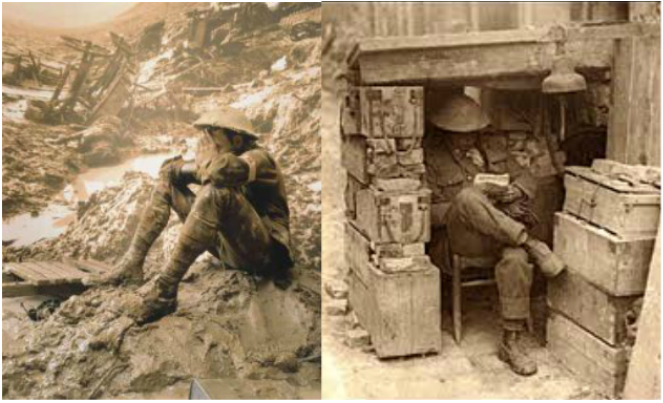
"Love just doesn't sneak up behind you and grab you by the hand when you most need it; you invariably have to reach out for it. When you find your love, the best thing to hold onto in life thereafter is each other.
The soldiers during the Second World War years knew how important it was to feel loved, especially when one was in the muddy trenches, never knowing if they would see their sweetheart's face one more time. They knew that love was like a war; easy to start, but hard to stop.
Some of the most moving love letters I have ever read were written not by the nations favourite poets such as Elizabeth Barrett Browning, Lord Byron, John Keats etc, but by soldiers in the trenches during the war years. They were scribbled often with a shortened, blunt pencil as the rain pelted down from overhead during a lull in the battle and yet, despite the conditions the soldiers endured, such letters were written from the heart and displayed an extraordinary elegance of ordinary men going about their everyday duty. It was the most ironic sadness, but these letter writers often sensed when they were writing for their last time. They sensed the time you love the most is probably the time you have the least time remaining.
There was much grieving after the Second World War when one's husband was one of the fallen ones, never again to return to his wife and children. There was a type of woman however, who grieved in silence; a woman who had secretly planned to marry her sweetheart on his return and set up home together. When her sweetheart died in battle, not being a relative, she wasn't informed of his death and only heard of it long after the event. Often unable to attend his grave until after his funeral, she mourned in private with a hurt that couldn't be lessened however much she cried.
I once met such a woman who became like a second mother to me after my own mother had died. Her name was Henrietta Denton and she was to remain a spinster the whole of her 94 year life. I slept in her house during the last month of her life to care for her and it was during this time that she told me of her war-time sweetheart and the planned marriage that was never to be. She said she had never told another and had carried this secret with her ever since the 1940s.
After Mum Denton's death, I wrote a poem that told her story and the stories of so many other forgotten women like her. The poem is called, 'Arthur and Guinevere' and it can be freely read by accessing http://www.fordefables.co.uk/arthur--guinevere.html "William Forde: March 11th, 2015.
